QuestionSorry for all of the questions: When I am correcting the puppy and she nips into the air in my direction (while looking at me), what does this mean? Additionally, in reference to the nipping and biting: We have tried walking away from her, but she will follow us and continue to bite. In fact, the only time she has been affectionate was when we picked her up from the airport, and at the Vet, and grooming (she was shaking from being scared)
Ultimately my biggest concern is that she doesn't seem to want any loving attention such as petting her, brushing her or even holding her (unless she is tight asleep) In a million years I never thought I could even consider getting a pet, and having to rehome her, but at what point should someone consider if this is just a bad match? I am devestated at this point.
-------------------------
Followup To
Question -
Hello again, I finally got our puppy, and all of the sweet thoughts are slowly being drained away. She is almost always nippin at us, and sometimes it feels more like biting. She will be 9 weeks old tomorrow, and I have looked through several books, and got on different websites, but I feel none of it is making a real difference. She is an American type, chocolate, and I have read recently that the american breed is more rambunctious. Is it possible that this is a bad match for our family? I don't know what to think at this point....HELP!
Answer -
I am not sure why the books do such a poor job on this. I have so little experience with other breeds, maybe they are easier. I think the one Shepherd we had was just as bad as all the Labs about biting and chewing at least until she was 4 months old. It is a common enough problem, I have a stock answer. I have already given it once tonight, and it looks like I will need it for the next. I do see many questions like yours about other breeds too.
Young Labs, which I know best, and other puppies tend to very bad about
biting. You see a litter of them, and all the ones that are awake are biting
another one or themselves. I am not even sure they realize that when they are
alone, if they quit biting, they would quit being bitten. At 3 to 4 months
they are getting their adult teeth, and it seems they spend every waking
moment biting or chewing. One thing you can do at that stage is to knot and wet a piece of cloth. Then freeze it. The cooling will soothe the gums. Only let the puppy have it when you are there to watch it. I maintain a Lab's favorite chew toy is another Lab. Otherwise they settle for any person they can. They keep hoping to find one that won't yelp and jerk their hand away, or growl "Bad dog." and clamp their mouth shut. Then offer a chew toy. They keep trying despite hundreds of corrections. Another good technique is to quit playing and go away. Be sure to praise them when they are playing nice and not biting.
You just have to keep on correcting them, hundreds of times, not dozens.
Provide sturdy, safe toys such as Kongs and Nylabones. Avoid things they can
chew pieces off and choke on them. Keep them away from electrical cords.
Crates are essential for most young Labs and other dogs.
You are not alone. Try to find a copy of Marley and Me. I got one for fathers' day.
AnswerYou have to understand that to her, biting you is a sign of affection. She spent most of her life biting her litter mates and expects you to enjoy it too. You are confusing her by being so weird.
The snapping at the air is another matter. That shows she does not accept your higher ranking in the pack. The key to most behavior problems is approaching things using the dog's natural instincts. Dogs see all the people and dogs in the household as a pack with each having their own rank in the pack and a top dog. Life is much easier if the 2 legged pack members outrank the 4 legged ones. You can learn to play the role of top dog by reading some books or going to a good obedience class. A good obedience class or book is about you being top dog, not about rewarding standard commands with a treat. Start at http://www.dogsbestfriend.com/
You should start obedience training now. Likely it is covered in the books you have looked at. At that age, you must keep the sessions very short, only a few repetitions at a time.
Here are some more exercises that will help.
''Elevation for small puppies: Sit on the floor and gently put your hands around your pup's middle, below his front legs, and lift him up. He is facing you. Hold him for 15 seconds. Repeat until he no longer struggles. If he is past 10-12 weeks, lift his front feet off the ground, but don't pick him up.
Cradling for small puppies: Hold your puppy gently on his back, as you would cradle a small baby. If he struggles, hold him firmly until he quiets for 10-15 seconds. With larger pups, you can do this as your sit on the floor, with your pup between your legs.
Quiet lying down: Place your pup on the floor on his side, with all 4 legs pointing away from you. Use your hands on his neck/shoulder area and middle, to hold him in this position. When he is quiet, praise him. Lengthen the time that you keep him quietly in this position. When he accepts this position well, handle his paws and muzzle, while keeping him quiet.''
The quotes mean this isn't my original work. It is copied from my Puppy Raising Manual. I have long used these or minor variations of them, and they are very effective in both establishing you as top dog and bonding. You may want to give her a belly rub while she is on her back too. Helps bonding. There is a big difference between her rolling over and demanding a belly rub, and you choosing a time to roll her over and rub her belly. The latter cements your place as pack leader. These can be used as corrections when she snaps back after a correction. Labs can be difficult at times. We really struggled with some of our first ones. We have had a string of sweethearts recently, and have to remind our friends our dog is doing better than theirs, not because we are so good, but that we have an easy puppy.
Some of the easier puppies settle down as they mature and become almost boring. Yours should become easier to manage, but still be a fun dog. She could grow up to be an obedience or agility star.

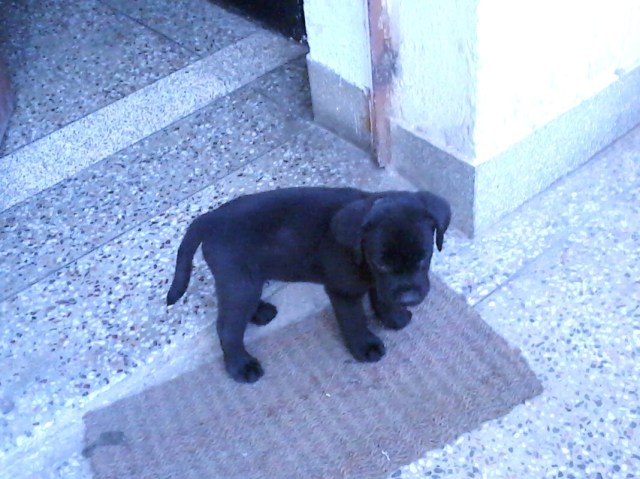 labrador diet
Question
striker
i have a black male Labrador of 4 mont
labrador diet
Question
striker
i have a black male Labrador of 4 mont
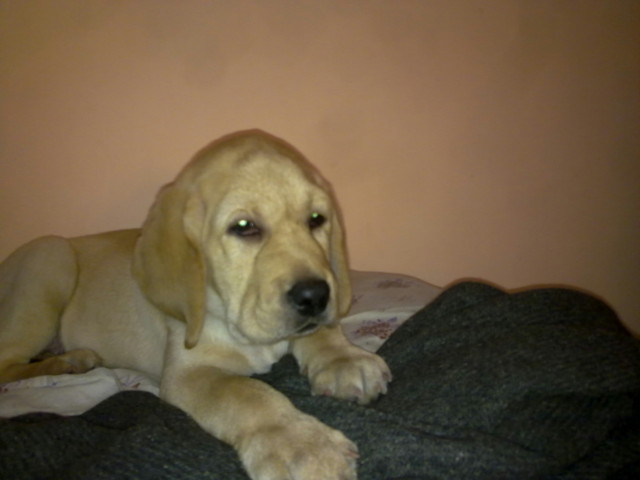 the furious nature of my lab
Question
hero-male lab
he is a fawn coloured 3 and a ha
the furious nature of my lab
Question
hero-male lab
he is a fawn coloured 3 and a ha
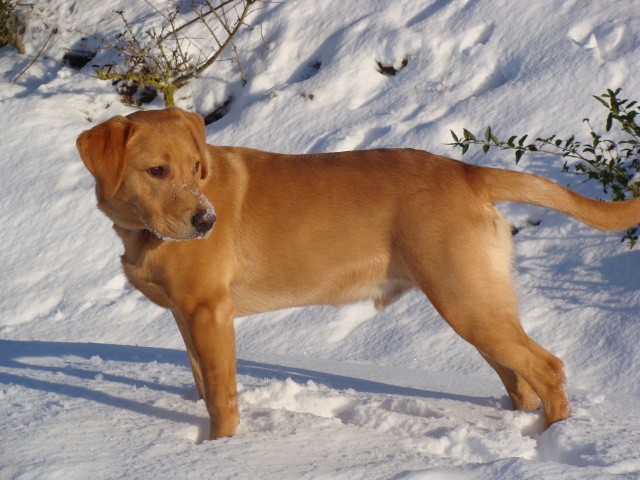 Fox Red/Yellow Lab size query
Question
Hi,
I have a 6 1/2 Fox Red/Yellow lab (Pedig
Fox Red/Yellow Lab size query
Question
Hi,
I have a 6 1/2 Fox Red/Yellow lab (Pedig
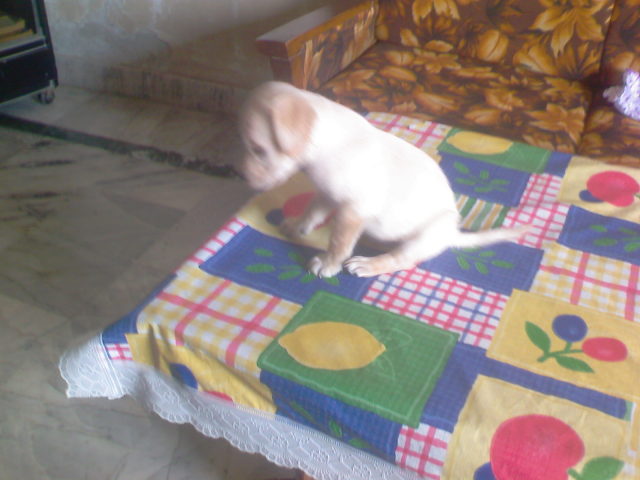 about my female dogs height
Question
sitting on table
i got a fawn coloured female
about my female dogs height
Question
sitting on table
i got a fawn coloured female
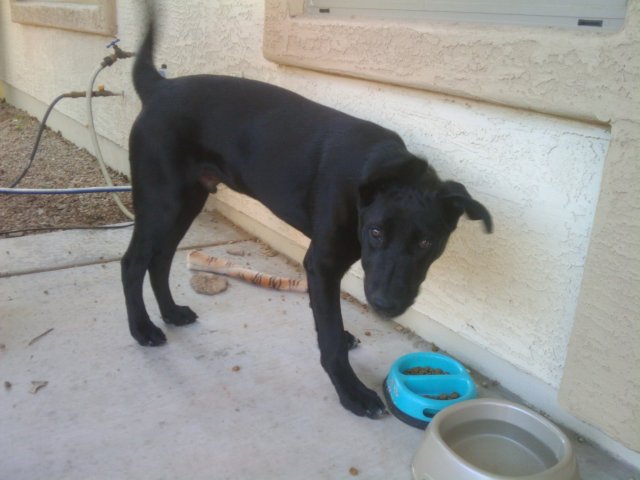 Black Lab age/weight concern
Question
Okimasu
I have a black lab mix. He has a small
Black Lab age/weight concern
Question
Okimasu
I have a black lab mix. He has a small